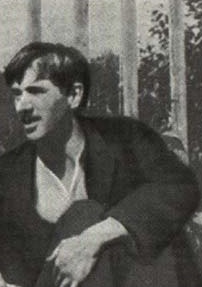Biography Korney Chukovsky

Korney Ivanovich Chukovsky (1882–1969) (real name, Nikolay Vasilyevich Korneychukov) is a famous writer of children’s books, publicist, critic, and translator. He was born in St. Petersburg, out of wedlock to Emmanuil Levinson, and Yekaterina Korneychukova. His parents separated soon after Nikolay’s birth. Nikolay spent his childhood in Odessa. He studied English and French by himself and read Edgar Allan Poe and Walt Whitman, Thomas Mayne Reid, Alexander Dumas, Robert Stevenson and Walter Scott in original. He got his school diploma by correspondence.
In 1901, he started writing articles and feuilletons, interviewing writers who visited Odessa, such as Ivan Bunin, Aleksandr Kuprin and others for the weekly newspaper Odessa News. Later, he spent two years in London working as a reporter for Odessa News.
In 1904-1906 he settled in St. Petersburg, working as a literary critic for Scale, a Symbolist magazine on literature, bibliography and criticism. At that time, he adopted the pen name Korney Ivanovich Chukovsky. In 1906, Korney Chukovsky moved to the summer settlement of Kuokkola, an hour’s drive from St. Petersburg, where he lived, year-round, with his family until the revolution of 1917.
When he returned to London in 1916 as the representative of the journal Niva, he served as an observer of Britain and Britain’s attitude to Russia. His critical works had always played a part in shaping British perception of Russian literature. His experience of London inspired his interest in mass culture, which became his defining theme as a literary critic in in his pre-revolutionary writings (Vaninskaya, 2011).
Since then, Chukovsky translated Anglophone poetry and prose — Walt Whitman, Oscar Wilde, G.K. Chesterton, O. Henry, Conan Doyle, as well as nursery rhymes — to Russian. Right after the revolution, in 1918, Chukovsky had participated in the World Literature Translation Project established by Maxim Gorky. The goal of the project was to make good translations of the best of world literature available to a large Soviet readership. From the 1920s onward, he was a cultural diplomat on behalf of Britain in the USSR, and facilitated communication between Western writers and scholars and their Soviet counterparts.
Korney Chukovsky only became interested in children’s literature and psychology when he was already an established literary critic and a translator. His love for British folk poetry, nonsense children’s literature and nursery rhymes transformed his own writing style, culminating in original nonsensical poetry full of humor, word play and rhythmic patterns (Leighton, 1972). His verse tales Crocodile (1916-17), Giant Cockroach (1921, published by Raduga Publishers in 1923), Wash ’Em Clean (1923), Buzzy-Wuzzy Busy Fly (1924) and other children’s verses quickly became popular and are still read to Russian children. Chukovsky is considered one of the first writers to start writing for very young children. His verses introduced a language that emphasized sound patterns over rational storytelling. Bizarre imagery and nonsense verse were carefully crafted and hold great appeal to younger children. His poetry has positive attributes for children, including strengthening their language skills and nurturing creative instincts—particularly with regard to using words in unusual ways and learning problem-solving. He was also known among psychologists and linguists for his work From Two to Five (1928) that dealt with children’s language and childhood development.
However, in the 1930s the value of Chukovsky’s children’s verses has been the source of a debate, with many critics dismissing its fanciful elements as merely “gibberish” that contains strange or surreal ideas. Chukovsky’s children’s stories came under scrutiny by Nadezhda Krupskaya, the wife of the USSR’s founder Vladimir Lenin. She mocked Chukovsky’s nursery rhymes and claimed that his format and content did not fully correspond to the aims of Soviet pedagogy. Chukovsky was deeply affected and subsequently could not write for a long time.
From 1938 onwards, Korney Chukovsky and his family spent more time at his dacha in the writers’ colony in Peredelkino near Moscow. His country house was adjacent to a special children’s library built and stocked by him. The house was also the gathering place for some of the Moscow intelligentsia and Western visitors.
His lifelong studies in the field of theory of translation comprises a volume The Art of Translation, on which he worked from 1919 until its publication in 1964. The most of Chukovsky’s translations is prose. Rudyard Kipling’s The Jungle Book and Just So Stories went through hundreds of editions. His translations of Daniel Defoe’s Robinson Crusoe, Rudolf Eric Raspe’s The Surprising Adventures of Baron Munchausen, Mark Twain’s both The Adventures of Tom Sawyer and The Prince and the Pauper were best sellers of children’s classics.
By the 1960s, more of Chukovsky’s children’s verse had been translated into English than his criticism. In the meantime, his lifetime work on Nekrasov, Mastery of Nekrasov was awarded with Lenin Prize. His book Live as Life (first published in 1962) advocated for the preservation of a lively, vibrant Russian language. Given his reputation in the Soviet Union, Western literary scholars recognized Chukovsky’s role in the wider British public’s reception of Russian literature. In 1962, Chukovsky received an honorary Doctorate in Letters from Oxford University.
Sources
Goloperov, V. “Korney Chukovsky: Odessa’s Famous And Also Unknown Writer” 2016.
Leighton, L. ‘Homage to Kornei Chukovsky’,Russian Review, 31 (1972), 38–48
Vaninskaya, A. ‘Korney Chukovsky in Britain’, Translation and Literature, vol. 20 (2011), no. 3, pp. 373-392 .https://doi.org/10.3366/tal.2011.0037


